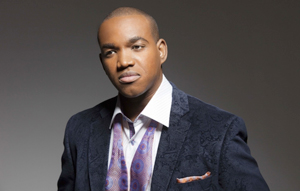by Timothy Robson

His recital on Thursday, February 26 on the Tuesday Musical concert series at E.J. Thomas Hall in Akron was brilliant from beginning to end, confirming Brownlee’s place in the firmament of opera superstars. His concert can be considered one of the musical highlights of this season.
Brownlee sang a varied program in four languages (Italian, German, Spanish and English) and in a wide variety of styles, accompanied by his accomplished duo partner, the excellent pianist Kevin Murphy. Brownlee seemed most comfortable in the Italian and English works, but his diction was impeccable throughout.
Mozart’s concert aria Misero! O sogno… Aura che intorno spiri is a miniature cantata, opening with an extended recitative that sets the stage for the main part of the aria: the song of a lover lamenting that he will never again see his beloved. Like many Mozart arias, it sounds deceptively simple but is filled with land mines: long legato phrases, exposed entrances, varied emotions. Brownlee made it all seem easy. His sound was clear and pure from top to bottom, and his phrasing captured the sense of the text. Murphy’s performance of the reduction of the original orchestral accompaniment captured the essence of the orchestra.
Austrian Joseph Marx (1882-1964) had the misfortune of beginning his composing career at the exact moment that fellow Viennese composer Arnold Schoenberg was rejecting conventional tonality and espousing the beginnings of atonality. Marx’s musical language, however, was that of a Romantic. His extended tonality, more impressionistic than chromatic, is more Italian and French than Germanic. He wrote well over a hundred songs — not household names, but revived with some regularity. Marx may have been overshadowed by Schoenberg, Berg and Webern, but his songs are lyrical and enchanting to hear, especially in performances as polished as those of Lawrence Brownlee.
Three of the five songs performed on this concert were especially noteworthy. “Nocturne,” with its exotic, virtuosic accompaniment, was full of emotional outpourings (the “sweet scents” depicted in the text). “Selige Nacht” was more restrained, but almost openly erotic. Brownlee nailed the astonishing, unexpected and exposed high note in the next-to-last phrase, “Träume des Rausches” (“Dreams of desire, so full of longing”). “Die Elfe” was quick and scherzo-like, with a staccato accompaniment.
To close the first half of the program, Brownlee sang three of Franz Liszts’ settings of sonnets by the 14th-century Italian Francesco Petrarca (commonly known as Petrarch). These are showpieces that demand utmost musicality from both singer and pianist. Brownlee demonstrated complete control in the high registers and the ability to create long crescendos on held notes, as well as to float high notes very softly.
The second half of the program was more informal, but no less accomplished. Prior to the works listed in the program, Lawrence Brownlee and Kevin Murphy collaborated on a number with the chorus of the Youth Excellence Performing Arts Workshop (YEPAW). It was an excerpt from the musical theater work Paul, to be performed by YEPAW in April. (See www.yepaw.org/paul for more details.) The short song was in a quasi-gospel style, with Brownlee singing the lead and the choir performing backup response. Brownlee and Murphy attacked their assignments with gusto, and the choir was solid and well-prepared. After the performance, Brownlee spoke about his introduction to music and the wider world beyond Northeast Ohio through an organization similar to YEPAW, and about his involvement in the music program at his home church. He introduced his parents and his wife, who were in the audience.
The Argentine composer Alberto Ginastera arranged five short, popular Argentine songs, with imaginative accompaniments, alternately jazzy and lyrical. It is a charming cycle with some haunting moments, notably Brownlee’s exquisite humming passage in the lullaby “Arrorró.”
Likewise, the four songs by American Ben Moore, based on texts by William B. Yeats and James Joyce (two each), might not be timeless masterpieces but were well-made and a pleasure to listen to.
Before his last set, Lawrence Brownlee acknowledged his debt to the great African-American singers who preceded him — notably Marian Anderson and Leontyne Price — and their landmark concert performances of arrangements of Spirituals. Brownlee has invigorated that tradition by commissioning composer/pianist Damian Sneed to create new arrangements of several familiar Spirituals. These are not the staid arrangements of the past. They are contemporary, complex in rhythm and harmony, but still effective in communicating the deep religious sentiments found in the songs. Although the complete texts for Every time I feel the spirit; Balm in Gilead; All night, all day; Deep river; and Come by here, dear Lord (aka Kum bah yah) were printed in the program, only the refrains were sung. Brownlee dedicated the performance of All day, all night, set as a lullaby with references to angels watching over us, to his young son Caleb, who is autistic. It was a touching moment, and Brownlee’s performance was especially heartfelt.
A loud ovation at the end prompted an encore. Brownlee made a disclaimer: he had just returned from an operatic engagement in Germany and felt that his voice had not yet settled back into this time zone and climate. Nonetheless, without further announcement he loosened his tie and launched into one of his signature arias, “Ah! Mes amis, quel jour de fête!” from Donizetti’s La fille du Régiment, notable for its famous nine high C’s. The disclaimer was hardly necessary. Lawrence Brownlee’s astonishing performance brought down the house.
Published on ClevelandClassical.com March 3, 2015.
Click here for a printable copy of this article



